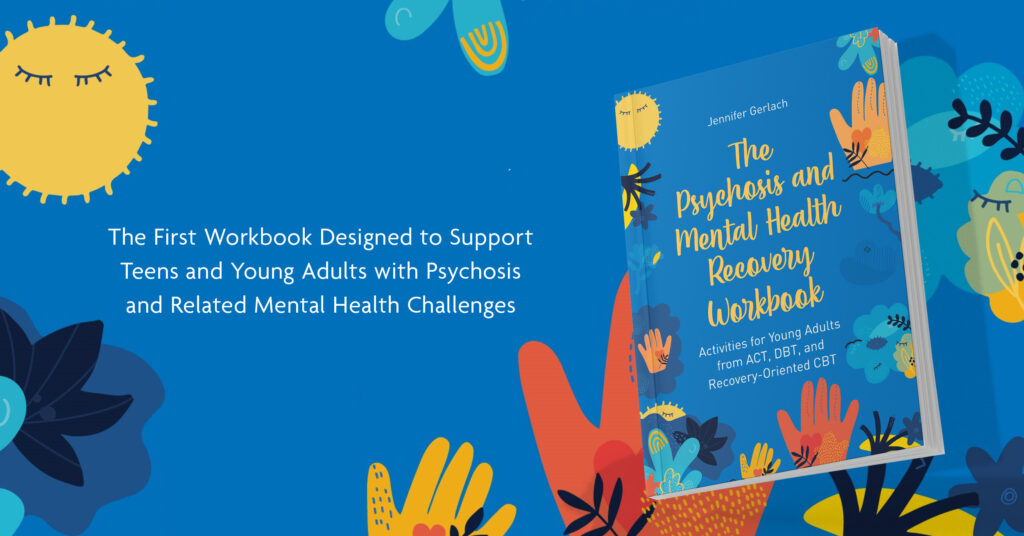
This blog post was written by JKP author Jennifer Gerlach.
Workbooks have been a mainstay as a clinical tool and in self-help for decades. As a therapist, I have appreciated those moments when I can crack open an activity book and find just the right tool for a client’s needs. Still, I have encountered a desert when it comes to youth-friendly resources on more serious mental health challenges such as psychosis, bipolar disorder, and severe depression. This is particularly worrying as these particular diagnoses tend to onset in young adulthood.
I have worked in the mental health field for close to 12 years now, however, I have known about this gap for 19 years.
Let me explain.
Nineteen years ago, at the age of 13, I found myself in a hospital after a series of confusing experiences. Upon my release, several words appeared on my discharge paperwork including, “depression with psychotic features” and “psychosis.”
Psychosis. Even the word felt demoralizing. A parade of images involving the word, ‘psycho’ entered my mind. I wondered what this meant for my future aspirations of going to college, finding a life partner, and having a normal adolescence. Would my life now be a ride on a carousel of hospitalizations, and symptoms?
I went to the library.
Amid the shelves upon shelves of books on everything from ‘teen pregnancy’ to ‘dyslexia,’ I found nothing on psychosis or mental health recovery. This only furthered my sense of hopelessness and outlook on the future. I wondered to myself if people with this kind of challenge were so impaired that they did not read.
Breathing.
Research shows that many people living with psychosis and other serious mental health challenges go on to live meaningful lives. Early intervention can make a significant difference in outcomes across the board. In the case of psychosis, intervention within the first five years of illness can be likened to intervention within the critical period after a stroke in terms of treatment efficacy. Still, pervasive pessimistic attitudes toward psychosis and stigma discourage many from seeking help until symptoms have reached crisis levels.
After years of psychotherapy, support groups, medication adjustments, peer support, recovery classes, and repeatedly practiced skills, I found my concerns unrealized and myself thriving. I went on to complete graduate school and engage my dreams.
I remembered what it was like to be a young adult fearful for her future, and wished for a way to give back specifically to this population. I committed myself to share with others the truth that living well with a mental health condition is possible and providing helpful tools to those in need.
Within the The Psychosis and Mental Health Recovery Workbook: Tools for Young Adults from ACT, DBT, and Recovery-Oriented CBT, you will find a guide designed to be accessible to individuals of all ages. Each chapter gleams clinically sound information, pieces of my story, and easy-to-apply worksheets and tools.
Topics covered include many relevant to individuals living with any mental health condition, such as identity beyond the illness, mindfulness, self-advocacy, and making sense of one’s story. Other sections focus on recovery in terms of cultivating and moving toward aspirations and navigating work, school, and social situations. In addition, some chapters spotlight issues specific to psychosis, things like coping with voices, paranoia, and negative symptoms.
As I crafted this workbook, I thought of three things; the evidence-based practices for these challenges, the needs of clients I have met over the years, and the guidance that helped me. I mixed youth-friendly speech with strategies rooted in Acceptance and Commitment Therapy (ACT) and Recovery-Oriented Cognitive Behavioral Interventions. I kept blocks of text to a minimum, focusing on exercises for the reader to integrate into their life.
Below are two worksheets from The Psychosis and Mental Health Recovery Workbook, designed to assist the reader in planning for a visit with a prescriber and a therapist.
Getting the Most out of Your Visit With Your Prescriber (Psychiatrist, Nurse Practitioner, etc.)
Preparing topics to discuss with your provider can be helpful to getting the most out of your visit. Feel free to complete this worksheet and bring it with you to your next appointment.
Aspirations that are important to me right now (such as relationship, work, or education goals):
1.____________________________________________________________________________________________
2. ___________________________________________________________________________________________
3. ___________________________________________________________________________________________
Symptoms that are most affecting my life right now:
1.____________________________________________________________________________________________
2.____________________________________________________________________________________________
3. _________________________________________________________________________________________
Ways medication is helping me:
1. ___________________________________________________________________________________________
2. ___________________________________________________________________________________________
3. _______________________________________________________________________________________
Side effects I have concerns about:
1. __________________________________________________________________________________________
2.____________________________________________________________________________________________
3.____________________________________________________________________________________________
Other questions I have:
1.____________________________________________________________________________________________
2. ___________________________________________________________________________________________
3. ___________________________________________________________________________________________
Getting the Most out of Your Visit With Your Therapist
Preparing topics to discuss with your provider can be helpful to getting the most out of your visit. Feel free to complete this worksheet and bring it with you to your next appointment.
Aspirations that are important to me right now (such as relationship, work, or education goals):
1. ___________________________________________________________________________________________
2. ___________________________________________________________________________________________
3. ___________________________________________________________________________________________
Steps I have taken this week toward my aspirations:
1.____________________________________________________________________________________________
2.____________________________________________________________________________________________
3. ___________________________________________________________________________________________
Symptoms getting in the way of my aspirations:
1. ___________________________________________________________________________________________
2. ___________________________________________________________________________________________
3. ___________________________________________________________________________________________
Other topics to cover today:
1. ___________________________________________________________________________________________
2.____________________________________________________________________________________________
3. ___________________________________________________________________________________________
The Psychosis and Mental Health Recovery Workbook is available now.